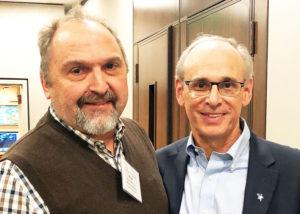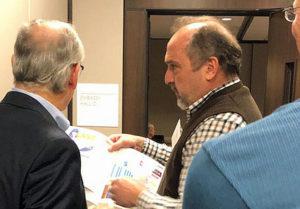Dr. Brian Meeker, DO, a physician with Virginia Gay Hospital and Clinics attended the American Association for Primary Care Endoscopy (AAPCE) event in Atlanta, Georgia on November 2nd and 3rd. Dr. Meeker shared data from the Centers for Disease Control (CDC) showing that Virginia Gay’s prevention and awareness efforts have helped make Benton County’s rate of colon cancer for people 50 years and older the lowest in Iowa. The data also show that the incidence of all types of cancer in Benton County is lower than all the surrounding counties. Colorectal cancer caused 50,630 deaths in 2018. It is the third-leading cause of cancer deaths in the U.S. and a form of cancer that regular screening can prevent. “Iowa has an elevated risk of colon cancer; the state is ranked fifth in both incidence and deaths,” said Dr. Meeker. “The increased risk Iowans face is another reason we are very proud of achieving the lowest incidence rate of colorectal cancers in the entire state among people who are 50 years old and older.” Meeker believes integrating colonoscopy services into primary care has been an essential component to achieving the low rate. “When a patient has to drive for 45 minutes or an hour to be screened and sometimes has to wait months for an appointment, they are more likely to avoid having the procedure. Colonoscopy is the only screening that saves lives, and the more people we screen, the lower the rate of colon and rectal cancer.” “We’ve made this a priority for 25 years,” explained Dr. Meeker, “and our data shows that our record of safety is much better than the national average and that we are extremely effective in finding the polyps that eventually cause colon cancer. Now we know we’ve helped achieve the lowest incidence of colorectal cancer in Iowa because of everyone’s hard work over such a long period.” “In the 4,000-plus colonoscopies we’ve performed, there were many tens of thousands of pre-cancerous polyps we’ve removed and destroyed,” said Meeker. “Removed polyps don't grow to become cancers, and the cancer data show that our patients enjoy longer lives because of the screening we perform.” “We take a team approach during a colonoscopy, and I believe having eight sets of experienced eyes looking at the monitor improves detection rates,” Meeker said. “It isn’t uncommon for a team member to ask him to stop to examine something they’ve found. “I’m guiding the instrument and am the one removing polyps, but everyone in the room knows what we’re looking for and everyone is encouraged to help. See something say something is the motto.” “Colorectal cancer rates in the 80’s and 90’s were climbing, and we weren’t effectively combatting the disease,” according to Meeker. “Back then most people were screened with a sigmoidoscopy, which is an examination of the lower 1/3 of the colon. The idea was that if the lower 1/3 was clear of polyps, then the rest of the colon probably was as well. The number of sigmoidoscopies was increasing, but the cancer rate wasn’t going down. Sigmoidoscopy wasn’t the answer it was thought to be. The problem at the time was that colonoscopies were performed by general surgeons or by gastroenterologists, but there weren’t enough of those physicians to screen millions more people.” The American Academy of Family Physicians published a paper that encouraged family physicians to offer colonoscopy screening as a way of reducing colorectal cancer deaths. Dr. Meeker, who had always been interested in endoscopy services and its potential for saving lives, was quick to gain the training and experience needed to provide those services at Virginia Gay. “I had great support from Virginia Gay administrator Mike Riege, and our general surgeon at the time, Dr. Daly. He provided the training and supervision I needed because he was near the end of his career and he was committed to finding a better way to protect patients from this disease.” Only 5% of family physicians have gained colonoscopy expertise and provide the screening to their patients. In addition to colonoscopy being rare in the family medical setting, many patients believe colonoscopy screening is only available from specialists. “I am not a gastroenterologist; our team hunts polyps, and we do it well,” said Meeker. “As part of our screening, we do uncover gastrointestinal diseases and conditions that only a gastroenterologist is trained to manage. Sometimes we find it because the patient neglected to share all their entire health history or all the symptoms they’ve experienced. When we uncover signs of gastrointestinal conditions or diseases, we refer patients to a gastroenterologist who specializes in the treatment of those conditions."


Comments
Submit a CommentPlease refresh the page to leave Comment.
Still seeing this message? Press Ctrl + F5 to do a "Hard Refresh".